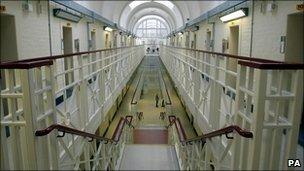Labour did not do enough to cut reoffending says Khan
- Published

Ministers are aiming to cut the prison population by 3,000 and to reduce costs.
Labour did not do enough to encourage prisoner rehabilitation while in office as they did not want to appear "soft on crime", a senior party figure has said.
Sadiq Khan said Labour's record on cutting prison numbers and reoffending rates during its 13 years in power could have been "much better".
But the shadow justice secretary said the coalition's penal policy was driven by the need "to cut costs not crime".
His Tory counterpart Kenneth Clarke has urged a "rehabilitation revolution".
Ministers want to cut the 85,000 prison population in England and Wales by 3,000 and tackle the causes of reoffending.
'Safety gamble'
In December, the justice secretary outlined plans to provide more help to address inmates' drug and alcohol addiction problems, establish regular work routines for prisoners to prepare them for life outside jail and to toughen up community sentences.
In his first major speech since taking on the shadow role last autumn, Mr Khan said he supported efforts to reduce inmate numbers but questioned the government's motives for doing so.
The opposition says 20% budget cuts to the prison and probation service over the next four years will make any rehabilitation-led approach much harder.
Penal policy was "founded on the short-term need to cut costs" and "arbitrary" targets for prison numbers, he said, rather than a considered focus on reducing crime.
"In the long run, they are risking increased costs by gambling with public safety," he told the Fabian Society. "There is a real and genuine danger that because of their policies crime will rise.
"Quite simply it is irresponsible to pursue this agenda without the investment to match it."
'Playing tough'
But Mr Khan admitted Labour, which is currently reviewing its policy in a number of areas including criminal justice, had failed to get a grip of reoffending during its own time in office.
"Reoffending rates are still too high, as is the prison population. I'm clear that this is one area where our scorecard in office would have said 'Could have done better'. Much better, in fact.
"We became hesitant in talking about rehabilitation and the merits of investment in bringing down reoffending rates. It was almost as if we had to give off the impression we were even more tough on crime just to demonstrate we weren't soft on crime.
"Playing tough in order not to look soft made it harder to focus on what is effective."
The Ministry of Justice said its objective was to break the "destructive cycle of crime" which had led to 14 prisons in England and Wales having reconviction rates of over 70%.
"Society has a right to expect the criminal justice system will protect them. Prison will always be the place for serious and dangerous offenders," a spokesman said.
"Prisons should also be places of hard work and industry and community sentences must be credible and robust. Criminals must be reformed so that when they finish their sentences they do not simply return to crime, creating more misery for victims."
- Published7 December 2010
- Published11 June 2011